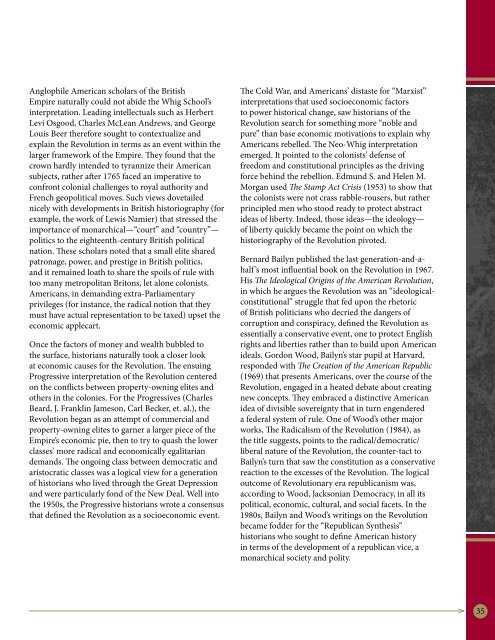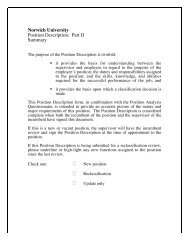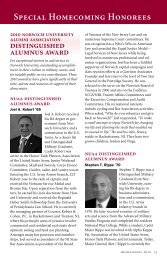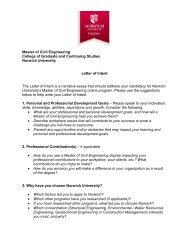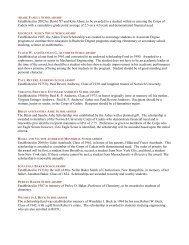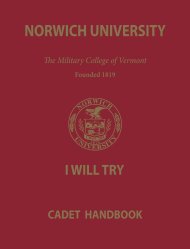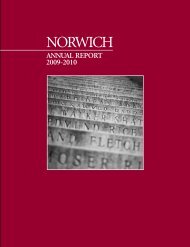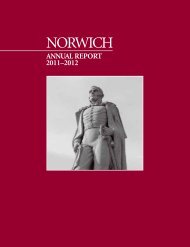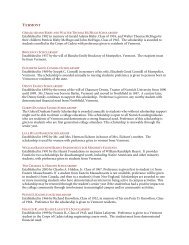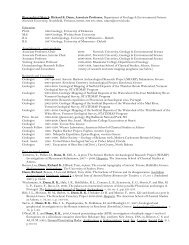Surviving Master's-Level History Programs at Norwich University: A ...
Surviving Master's-Level History Programs at Norwich University: A ...
Surviving Master's-Level History Programs at Norwich University: A ...
- No tags were found...
You also want an ePaper? Increase the reach of your titles
YUMPU automatically turns print PDFs into web optimized ePapers that Google loves.
Anglophile American scholars of the BritishEmpire n<strong>at</strong>urally could not abide the Whig School’sinterpret<strong>at</strong>ion. Leading intellectuals such as HerbertLevi Osgood, Charles McLean Andrews, and GeorgeLouis Beer therefore sought to contextualize andexplain the Revolution in terms as an event within thelarger framework of the Empire. They found th<strong>at</strong> thecrown hardly intended to tyrannize their Americansubjects, r<strong>at</strong>her after 1765 faced an imper<strong>at</strong>ive toconfront colonial challenges to royal authority andFrench geopolitical moves. Such views dovetailednicely with developments in British historiography (forexample, the work of Lewis Namier) th<strong>at</strong> stressed theimportance of monarchical—“court” and “country”—politics to the eighteenth-century British politicaln<strong>at</strong>ion. These scholars noted th<strong>at</strong> a small elite sharedp<strong>at</strong>ronage, power, and prestige in British politics,and it remained lo<strong>at</strong>h to share the spoils of rule withtoo many metropolitan Britons, let alone colonists.Americans, in demanding extra-Parliamentaryprivileges (for instance, the radical notion th<strong>at</strong> theymust have actual represent<strong>at</strong>ion to be taxed) upset theeconomic applecart.Once the factors of money and wealth bubbled tothe surface, historians n<strong>at</strong>urally took a closer look<strong>at</strong> economic causes for the Revolution. The ensuingProgressive interpret<strong>at</strong>ion of the Revolution centeredon the conflicts between property-owning elites andothers in the colonies. For the Progressives (CharlesBeard, J. Franklin Jameson, Carl Becker, et. al.), theRevolution began as an <strong>at</strong>tempt of commercial andproperty-owning elites to garner a larger piece of theEmpire’s economic pie, then to try to quash the lowerclasses’ more radical and economically egalitariandemands. The ongoing class between democr<strong>at</strong>ic andaristocr<strong>at</strong>ic classes was a logical view for a gener<strong>at</strong>ionof historians who lived through the Gre<strong>at</strong> Depressionand were particularly fond of the New Deal. Well intothe 1950s, the Progressive historians wrote a consensusth<strong>at</strong> defined the Revolution as a socioeconomic event.The Cold War, and Americans’ distaste for “Marxist”interpret<strong>at</strong>ions th<strong>at</strong> used socioeconomic factorsto power historical change, saw historians of theRevolution search for something more “noble andpure” than base economic motiv<strong>at</strong>ions to explain whyAmericans rebelled. The Neo-Whig interpret<strong>at</strong>ionemerged. It pointed to the colonists’ defense offreedom and constitutional principles as the drivingforce behind the rebellion. Edmund S. and Helen M.Morgan used The Stamp Act Crisis (1953) to show th<strong>at</strong>the colonists were not crass rabble-rousers, but r<strong>at</strong>herprincipled men who stood ready to protect abstractideas of liberty. Indeed, those ideas—the ideology—of liberty quickly became the point on which thehistoriography of the Revolution pivoted.Bernard Bailyn published the last gener<strong>at</strong>ion-and-ahalf’s most influential book on the Revolution in 1967.His The Ideological Origins of the American Revolution,in which he argues the Revolution was an “ideologicalconstitutional”struggle th<strong>at</strong> fed upon the rhetoricof British politicians who decried the dangers ofcorruption and conspiracy, defined the Revolution asessentially a conserv<strong>at</strong>ive event, one to protect Englishrights and liberties r<strong>at</strong>her than to build upon Americanideals. Gordon Wood, Bailyn’s star pupil <strong>at</strong> Harvard,responded with The Cre<strong>at</strong>ion of the American Republic(1969) th<strong>at</strong> presents Americans, over the course of theRevolution, engaged in a he<strong>at</strong>ed deb<strong>at</strong>e about cre<strong>at</strong>ingnew concepts. They embraced a distinctive Americanidea of divisible sovereignty th<strong>at</strong> in turn engendereda federal system of rule. One of Wood’s other majorworks, The Radicalism of the Revolution (1984), asthe title suggests, points to the radical/democr<strong>at</strong>ic/liberal n<strong>at</strong>ure of the Revolution, the counter-tact toBailyn’s turn th<strong>at</strong> saw the constitution as a conserv<strong>at</strong>ivereaction to the excesses of the Revolution. The logicaloutcome of Revolutionary era republicanism was,according to Wood, Jacksonian Democracy, in all itspolitical, economic, cultural, and social facets. In the1980s, Bailyn and Wood’s writings on the Revolutionbecame fodder for the “Republican Synthesis”historians who sought to define American historyin terms of the development of a republican vice, amonarchical society and polity.35


